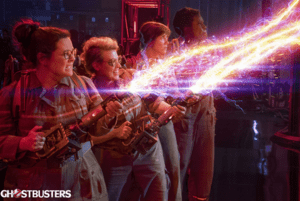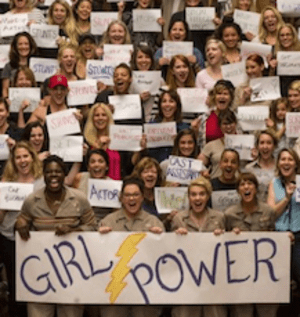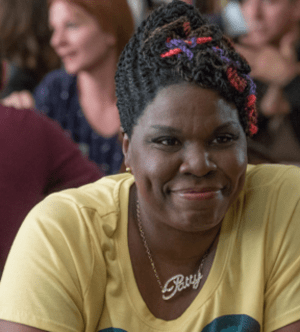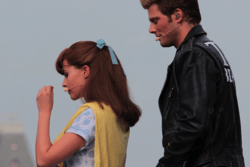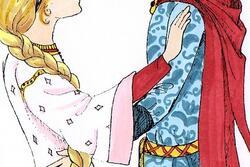Who Ya Gonna Call? Feminism and Race in This Summer's Ghostbusters Reboot
This summer, paranormal activity gets a new set of adversaries as four awkward and highly intelligent women come together to prove not only that ghosts are real, but that women are capable of rebooting a previously all-male franchise.
Abby Yates (Melissa McCarthy) and Erin Gilbert (Kristin Wiig) are childhood friends bound together by an interest in the paranormal and the exclusionary politics of high school. Flash forward twenty years and Erin is chasing respectability at Columbia University while Abby has teamed up with Jillian Holtzmann (Kate McKinnon) to prove the existence of ghosts. Some shady publishing practices and a haunted historical home bring the trio together. Later, they are joined by Patty Tolan (Leslie Jones), an autodidactic subway worker who sees a ghost. The four women work together to prevent a paranormal apocalypse brought about by the anger and plotting of a whiny white guy.
There are many things that the film does well. Unlike typical action films, the extended battle sequence is collaborative, with each woman both able to defend herself and to protect other members of the squad. These women use firepower, nuclear fusion, and decidedly unsexy beige jumpsuits to save the world with science and sisterhood.
The sexual tension between Wiig’s Erin Gilbert and McKinnon’s Holtzmann is unstated but subtly present. This chemistry made me wonder if Wiig’s flustered attraction to Chris Helmsworth’s character was added to reassure everyone’s conservative aunt and uncle that this movie hasn’t totally left behind its heteronormative and patriarchal roots.
Where in past films, such as Bridesmaids and The Heat, the optimism and grounded perspective of McCarthy’s characters have come hand in hand with outrageous acts of violence against fat women’s bodies for the sake of comedy, such dynamics are largely absent from Ghostbusters. McCarthy’s Abby Yates stands as the uniting and grounding force in the foursome and her little asides in the action scenes are hilarious. When a ghost steals the nascent Ghostbusters’ car, an exasperated Abby turns to the zany Holtzmann and asks, “You left the keys in the car?” sounding more like a tired parent than a woman about to save New York from total ghostly chaos. Watching Kristen Wiig’s character move from timidity to self-assurance as her strong female friendships buoy her self-confidence is definitely empowering. And Kate McKinnon’s Holtzmann may be one of the few instances in film where someone on the autism spectrum delivers the (quiet and monotone) final monologue as she tells the other women that, though fighting ghosts is important and science tells us how the world works, it is the connections we make and the communities we build, no matter how imperfect, that truly give life meaning.
With a retelling so bent on celebrating women and their capacity, feminist audiences may be left deflated by the representation of Leslie Jones’ character, Patty Tolan. Bored by her job as a subway worker, and interested in history, Patty is a walking encyclopedia of the class warfare and atrocities that have been committed in New York since its founding, often at the hands of white men. As the only woman of color in the film, Patty comes to stand, both physically and metaphorically, as a loud, brash, and aware testament to New York’s history of inequality. The dynamics of this inequality still persist, even at Ghostbusters Headquarters. Patty’s working-class background relegates her to the sidelines when the conversation turns scientific. While the three white women use their scientific knowledge to save the city, the film excludes Patty from the privilege of moving the plot forward. In intellectual scenes, she either falls silent or serves as one-dimensional comedic relief.
The racial and feminist tension comes to a head during a crowd-surfing scene. The crowd willingly receives McCarthy’s character and carries her to safety, but when Jones’ character tries to crowd surf, the audience moves away, leaving her to fall onto the dirty theater floor. “I don’t know if it is a race thing or a woman thing,” Patty yells, “but I am mad.” It is one of the few times that Patty’s race is explicitly acknowledged in the film and it is meant to be a nudge to the movie audience, a cinematic, “We aren’t like those people. We wouldn’t drop the woman of color.” But that is just what the movie does, uplifting Abby and the other white women, while its depiction of Patty falls flat. The cast members and director have been very vocal about the racist harassment Leslie Jones has since received since Ghostbusters was released, joining many others in retweeting #loveforlesliej and celebrating her talent. The film itself, however, tokenizes her character, refusing to move outside of the comfort of the "loud black woman" stereotype. Ultimately, this feminist retelling of Ghosbusters does little to change how women of color are portrayed in big budget franchise films.


